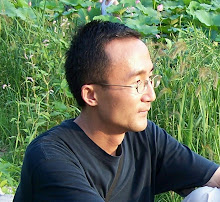Yesterday, when I talked to a friend of mine on China's nationalism, I said that the strong sense of national pride, achieved by compromising or undermining individual citizen's rights can't be called patriotism. Some of my friends prefer the word 'patriotism' to avoid negative connotation of 'nationalism', which in my view is just self-cheating. Actually, such a strong sense of national pride held by the most of Chinese, which in general is disproportionate to the development of civil society in China, is a worrisome sign.
China's strong sense of national pride after the Olympics might play a very important role in re-instating the sense of western nationalism if the development of civil society in China fails to eliminate doubts from the outside world. The division of the Self and the Other at the national level has never been so prominent since the end of the cold war. Coincidentally, Russia now might be another important factor in shaping western nationalism, especially after its invasion of Georgia, as conservative Robert Kagan argues in his recent essay that 'nationalism, and the nation itself, far from being weakened by globalization, has returned with a vengeance'.
The tricky thing is such a western nationalism is always a latent one, hidden behind universal values with the aim to differentiate You and Me, like Kagan's democracy vs. autocracy, but when one looks into the argument one would find what's really important to him is actually power play.
I think any argument tinged with such a mentality of the national power play, in the name of defending democracy, is a kind of nationalism, because it hijacks the universal notion - democracy to serve the writer's national interests, presumably western. It is for this reason that I'm very suspicious about Kagan's divisive thinking, as it might fanfare confrontation instead of promoting peace.
I'm not so sure what Kristof's view is about Kagan's history-is-back (I myself agree that history is back, but not in a sense of Kagan's argument about democracy vs. autocracy), and I'm not very comfortable either about his way of argument in his latest essay on China's rise. I even think he might fall into the trap of western nationalism by saying 'now it will be our turn to scramble to compete with a rising Asia'.
Does he? Granted that China's success so far in its development lies largely in its flexibility to cope with pressures either from the outside or from the inside, but the standpoint of Kristof is quite ambiguous. In fact, one can sense a bit his conservative undertone by playing up the rise of China, which nevertheless underlies his strong identification with the US (patriotic feeling as he may argue) instead of liberal values per se.
Interestingly, there is another critique from Gulf News by Amir Taheri, which sheds some insightful light on the similar concern about China after the Olympics. Instead of portraying China as a major competitor, threatening to gain more from other nations' existing interests in a zero sum game, Taheri poses questions rather from internal problems that China is currently facing without the reference to his own country. In a very concise way, Taheri touches three urgent issues that largely would shape the future of China.
The first one is the political reform,
'The Chinese ruling elite is divided between reformists and supporters of the status quo ante. Portraits of the Great Helmsman may have disappeared from public view for the duration of the games. But a good chunk of the elite, still drunk on the heady wine of Maoism, is biding its time. The final purge, both in terms of policy and personnel, has not yet taken place.'
The second one is the concern about China's role in the international arena,
'the international system needs a positive input from China. A policy of nay-saying and prevarication cannot deal with dangers, such as nuclear proliferation spearheaded by North Korea and Iran, that could ultimately affect China’s own security.'
And the third one is how to assimilate so large amount of migrant workers in Chinese society into a stable social stratum,
'The 300 million or so poverty stricken seasonal workers roaming from one end of the country to another could emerge as a veritable human tsunami, destroying all that China has built since the reforms introduced by Deng Xiaoping a generation ago.'
The analysis is insightful, problems are better articulated, and the questions posed by the writer are sharper. Sorry, Mr. Kristof, it is such a vigorous thinking without too much concern of the self-interest sets up the standard. Instead of some shallow cliches with the tone of nationalism, be it eastern or western, such an insightful argument is in need now. Quality matters!
8/21/2008
Subscribe to:
Post Comments (Atom)





No comments:
Post a Comment